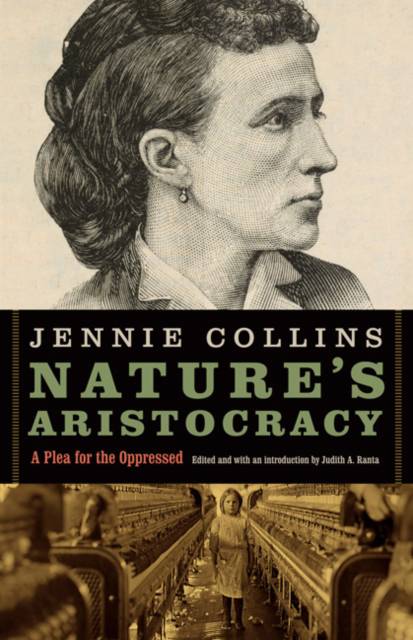
Door een staking bij bpost kan je online bestelling op dit moment iets langer onderweg zijn dan voorzien. Dringend iets nodig? Onze winkels ontvangen jou met open armen!
- Afhalen na 1 uur in een winkel met voorraad
- Gratis thuislevering in België vanaf € 30
- Ruim aanbod met 7 miljoen producten
Door een staking bij bpost kan je online bestelling op dit moment iets langer onderweg zijn dan voorzien. Dringend iets nodig? Onze winkels ontvangen jou met open armen!
- Afhalen na 1 uur in een winkel met voorraad
- Gratis thuislevering in België vanaf € 30
- Ruim aanbod met 7 miljoen producten
Zoeken
Nature's Aristocracy, Or, Battles and Wounds in Time of Peace
A Plea for the Oppressed
Jennie Collins
€ 53,45
+ 106 punten
Omschrijving
In 1871 Jennie Collins became one of the first working-class American women to publish a volume of her own writings: Nature's Aristocracy. Merging autobiography, social criticism, fictionalized vignettes, and feminist polemics, her book examines the perennial problem of class in America. Collins loosely structures her series of sketches around the argument that nineteenth-century U.S. society, by deviating dangerously from the ideals set forth in the Constitution and the Bill of Rights, had created a corrupt aristocracy and a gulf between the rich and the poor that the United States' founders had endeavored to prevent. Collins's text serves as a mouthpiece for the little-heard voices of nineteenth-century poor and laboring women, employing sarcasm, irony, and sentimentality in condemning the empty philanthropic gestures of aristocratic capitalists and calling for justice instead of charity as a means to elevate the poor from their destitution. She also explores the necessity of suffrage for female workers who, while expected to work alongside men as their equals in labor, were hampered by lower wages and lack of control by their exclusion from the voting process.
Specificaties
Betrokkenen
- Auteur(s):
- Uitgeverij:
Inhoud
- Aantal bladzijden:
- 260
- Taal:
- Engels
- Reeks:
Eigenschappen
- Productcode (EAN):
- 9780803219342
- Verschijningsdatum:
- 1/05/2010
- Uitvoering:
- Paperback
- Formaat:
- Trade paperback (VS)
- Afmetingen:
- 140 mm x 216 mm
- Gewicht:
- 335 g

Alleen bij Standaard Boekhandel
+ 106 punten op je klantenkaart van Standaard Boekhandel
Beoordelingen
We publiceren alleen reviews die voldoen aan de voorwaarden voor reviews. Bekijk onze voorwaarden voor reviews.











